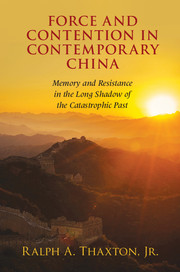 Force and Contention in Contemporary China
Force and Contention in Contemporary China Book contents
- Frontmatter
- Dedication
- Contents
- List of Illustrations
- Acknowledgments
- Cast of Characters for Da Fo Village and Several Other Villages in the Hebei-Shandong-Henan Border Area, 1945–2013
- Maps
- Introduction
- 1 The Violent Dawn of Reform
- 2 Contemporary Tax Resistance and the Memory of the Great Leap
- 3 Birth Planning and Popular Resistance
- 4 Rural Schools and the “Best Citizens of the State”: The Struggle for Knowledge and Empowerment in the Aftermath of the Great Leap
- 5 Official Corruption and Popular Contention in the Reform Era
- 6 The Rise of the Electricity Tigers: Monopoly, Corruption, and Memory
- 7 The Defeat of the Democratic Experiment and Its Consequences
- 8 Contentious Petitioners and the Revival of Mao-Era Repression
- 9 Migration and Contention in the Construction Sector
- 10 The Rise of the Martial Artists and the Two Faces of Mafia
- Conclusion: Big Questions and Small Answers from Da Fo
- Bibliography
- Index
- Miscellaneous Endmatter
4 - Rural Schools and the “Best Citizens of the State”: The Struggle for Knowledge and Empowerment in the Aftermath of the Great Leap
Published online by Cambridge University Press: 05 August 2016
- Frontmatter
- Dedication
- Contents
- List of Illustrations
- Acknowledgments
- Cast of Characters for Da Fo Village and Several Other Villages in the Hebei-Shandong-Henan Border Area, 1945–2013
- Maps
- Introduction
- 1 The Violent Dawn of Reform
- 2 Contemporary Tax Resistance and the Memory of the Great Leap
- 3 Birth Planning and Popular Resistance
- 4 Rural Schools and the “Best Citizens of the State”: The Struggle for Knowledge and Empowerment in the Aftermath of the Great Leap
- 5 Official Corruption and Popular Contention in the Reform Era
- 6 The Rise of the Electricity Tigers: Monopoly, Corruption, and Memory
- 7 The Defeat of the Democratic Experiment and Its Consequences
- 8 Contentious Petitioners and the Revival of Mao-Era Repression
- 9 Migration and Contention in the Construction Sector
- 10 The Rise of the Martial Artists and the Two Faces of Mafia
- Conclusion: Big Questions and Small Answers from Da Fo
- Bibliography
- Index
- Miscellaneous Endmatter
Summary
Mao Zedong's Great Leap Forward was a threefold war on Chinese villagers: a war for their resources, their bodies, and their minds. To capture the minds of village people, the Communist Party attacked the values and personal identities of the rural schoolteachers who stood for pluralistic discourse and fought against the reach of the imperious central party-state. In Da Fo, local party leaders loyal to Mao attacked the very people who, in the Republican period, had championed the efforts of villagers to stand up against Kuomintang state corruption and repression.
THE IMPACT OF THE GREAT LEAP FORWARD ON DA FO'S TEACHERS
In the early 1950s, the Communist Party set out to improve rural education, and the county party leaders set up a Teacher's Training School in Dongle county. According to Zheng Bingzhang, a graduate who went on to teach in Zhaozhuang village, the school graduated only fifty teachers in the years 1951–1955, and most villages were without qualified teachers. The situation deteriorated after 1955, and the school system collapsed during the Great Leap Forward. The Communist Party victory spelled trouble for Da Fo's vibrant system of schooling. The trouble actually began as early as 1951, before the so-called honeymoon phase of party rule, when the imposition of Mao's tonggou tongxiao (unified state purchase and sale of grain) policy on the Dongle county countryside had a devastating impact on rural education in general and on Da Fo's private school in particular. Prior to 1949, Da Fo village's school had been supported by voluntary private grain contributions from its big landowners, artisans, and small farmers – particularly from members of the dominant Bao lineage. Its teachers had a good track record of sending graduates on to Shangcun high school and the Kuomintang-managed postsecondary colleges, including the Daming Seventh Normal College – the regional college of first choice for young aspirants to teaching careers and official positions in the Nationalist government in the early 1930s. Teacher salaries, often paid in kind, were critical to sustaining the competitive position of Da Fo's school, and they constituted the largest part of the school's operating cost.
- Type
- Chapter
- Information
- Force and Contention in Contemporary ChinaMemory and Resistance in the Long Shadow of the Catastrophic Past, pp. 125 - 163Publisher: Cambridge University PressPrint publication year: 2016
